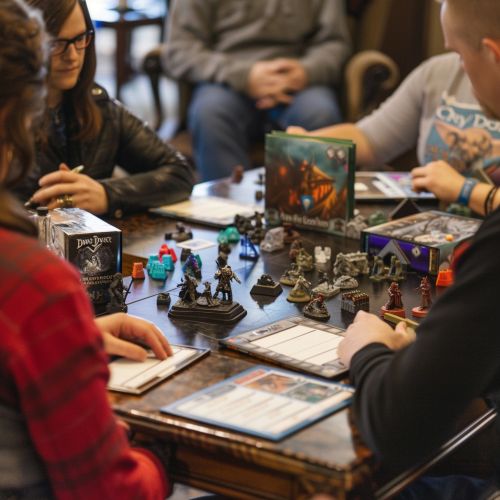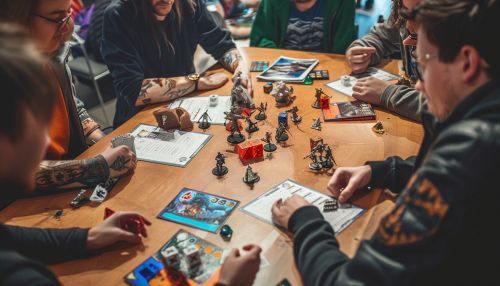Dungeons & Dragons
Overview
Dungeons & Dragons (D&D) is a fantasy tabletop role-playing game (RPG) originally designed by Gary Gygax and Dave Arneson. It was first published in 1974 by Tactical Studies Rules, Inc. (TSR) and has been published by Wizards of the Coast since 1997. D&D departs from traditional wargaming and assigns each player a specific character to play instead of a military formation. These characters embark upon imaginary adventures within a fantasy setting. A Dungeon Master (DM) serves as the game's referee and storyteller, while also maintaining the setting in which the adventures occur.


Gameplay
D&D is fundamentally a war game of imaginative adventures characterized by intricate, multilayered campaigns in a high fantasy setting. It uses polyhedral dice to resolve in-game actions and is famous for its distinctive twenty-sided die. A game is typically played by a group of players, usually from two to six, and a DM. The players each create a character by rolling dice for various attributes, such as strength and intelligence, and then choosing a race (such as human or elf) and a class (such as wizard or warrior).
Character Creation
In D&D, each player creates a character with a race, class, alignment, and personality. The character's race and class determine their abilities and skills. The alignment, a combination of ethical (lawful, neutral, chaotic) and moral (good, neutral, evil) attitudes, guides the character's behavior. The personality can be as detailed as the player wants, from a simple list of likes and dislikes to a complex psychological profile.
Races and Classes
D&D features a variety of playable races and classes. Races include humans, elves, dwarves, gnomes, half-elves, half-orcs, and halflings. Each race has unique abilities and characteristics. Classes are professions or vocations that determine a character's skills and abilities. They include warriors, wizards, rogues, and clerics, among others.
Dungeon Master
The Dungeon Master (DM) plays a pivotal role in D&D. The DM acts as the referee and narrator of the game, describing what the players see and hear in the game world, playing the roles of the characters and creatures they meet, and deciding the outcomes of their actions. The DM also creates the game world, which can be an original creation or a published D&D setting.
Editions
Since its inception, D&D has been published in multiple editions, each with its own rules and gameplay mechanics. The current edition, the fifth, was released in 2014 and is known for its simplicity and flexibility, allowing for a wide range of play styles.
Impact and Legacy
D&D has had a significant impact on popular culture and on the development of other RPGs. It has been cited as an influence by numerous authors, filmmakers, and game designers. Its success led to the creation of a vast array of derivative products, including books, films, television series, video games, and other merchandise.
